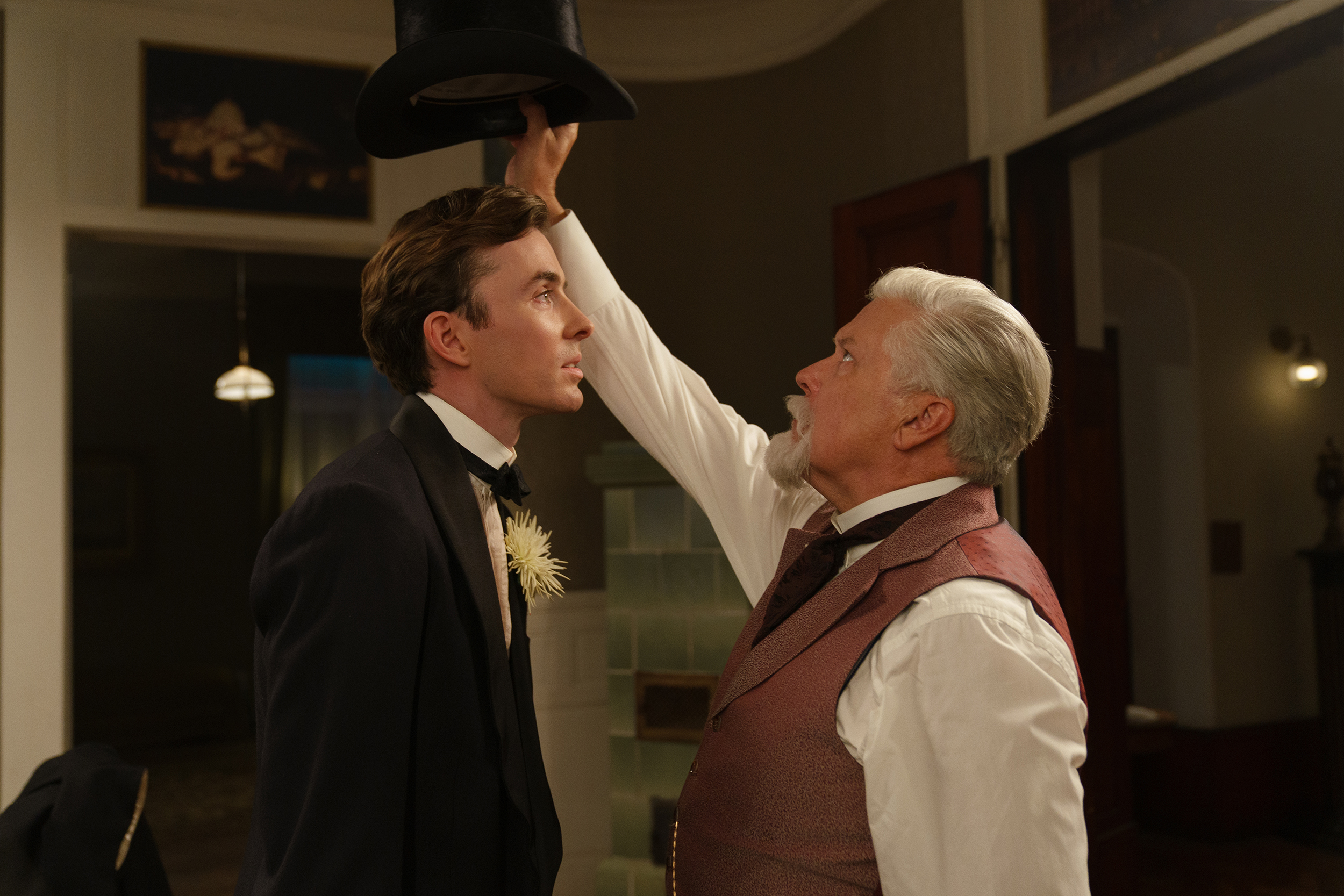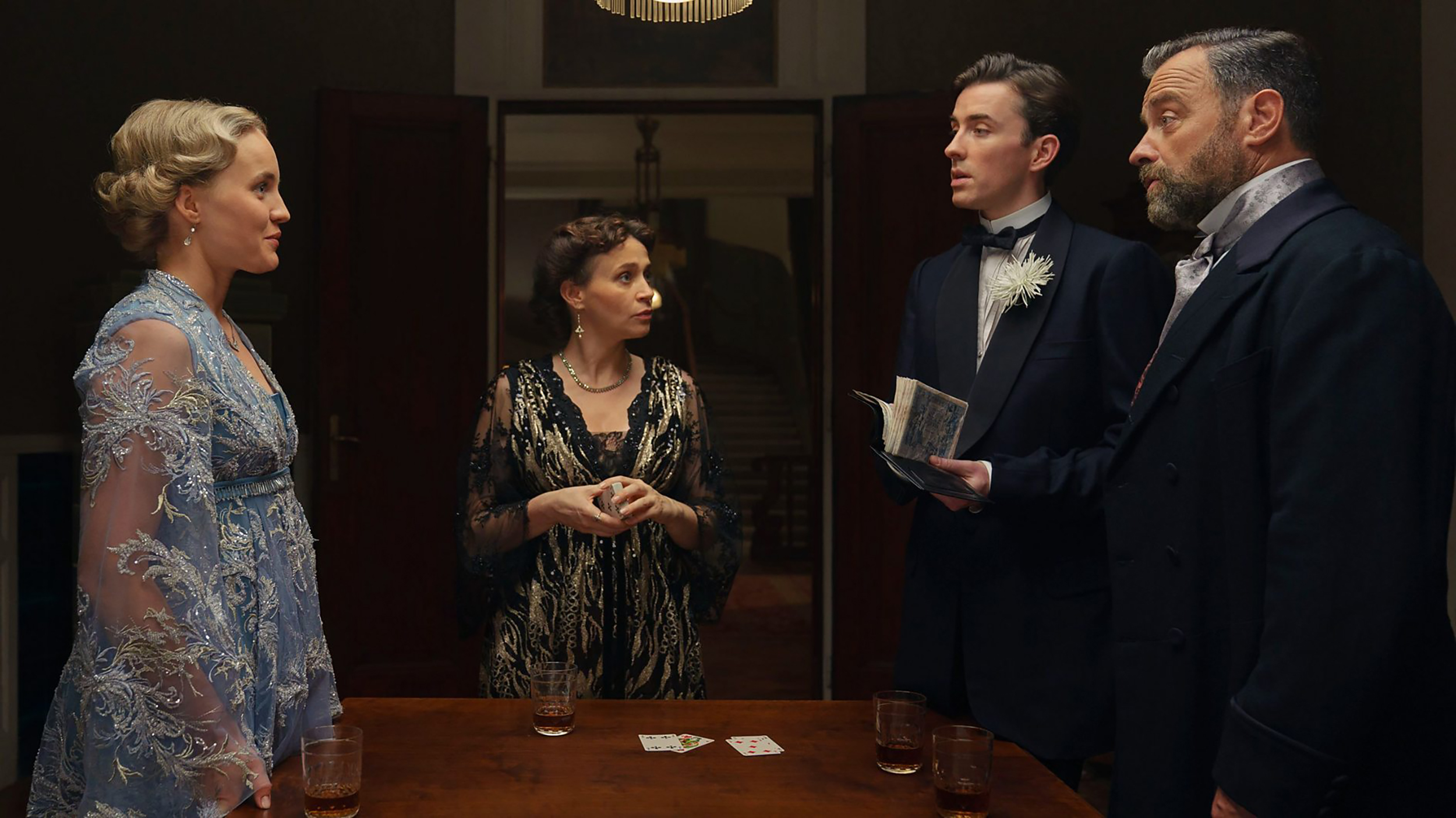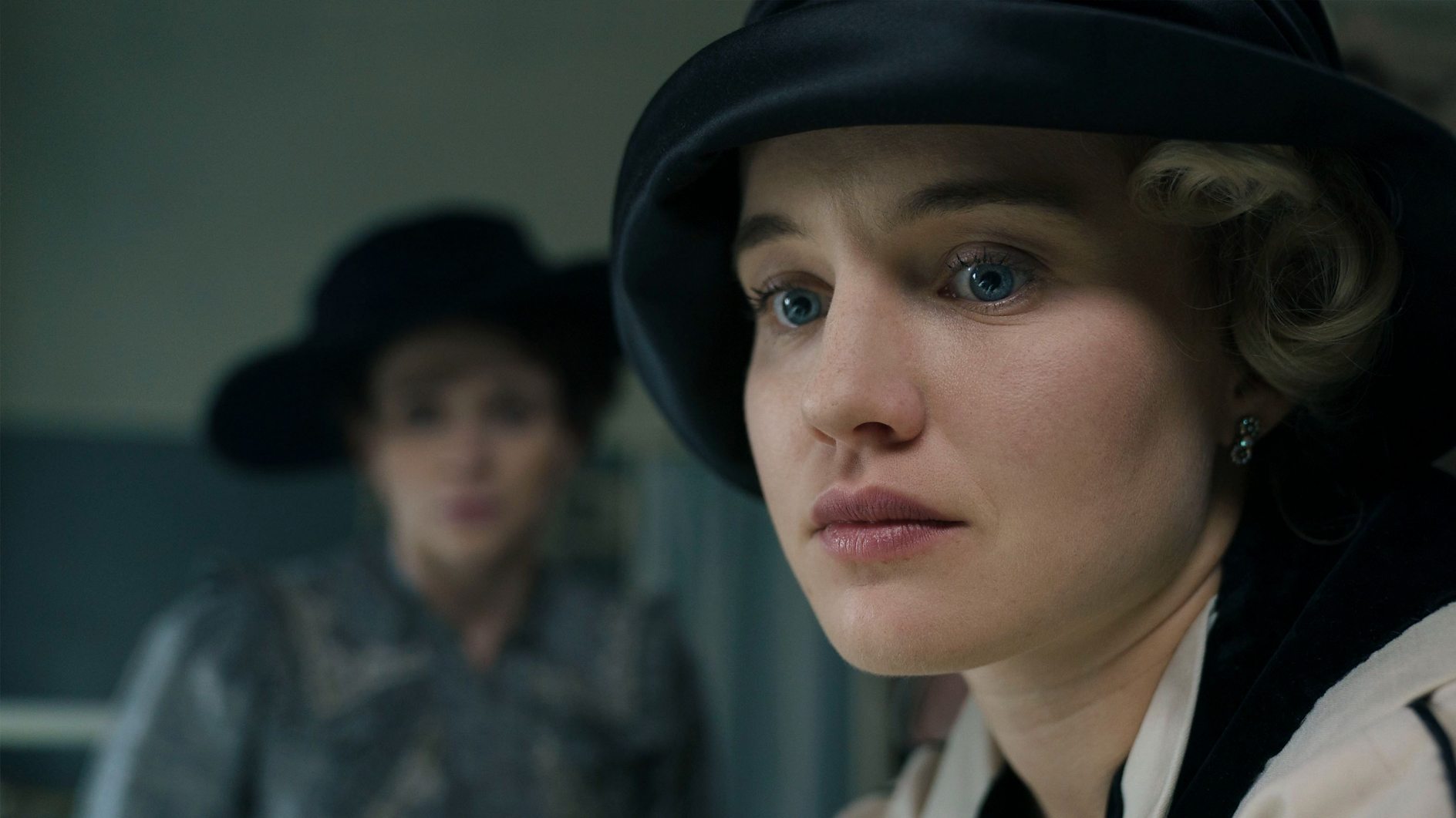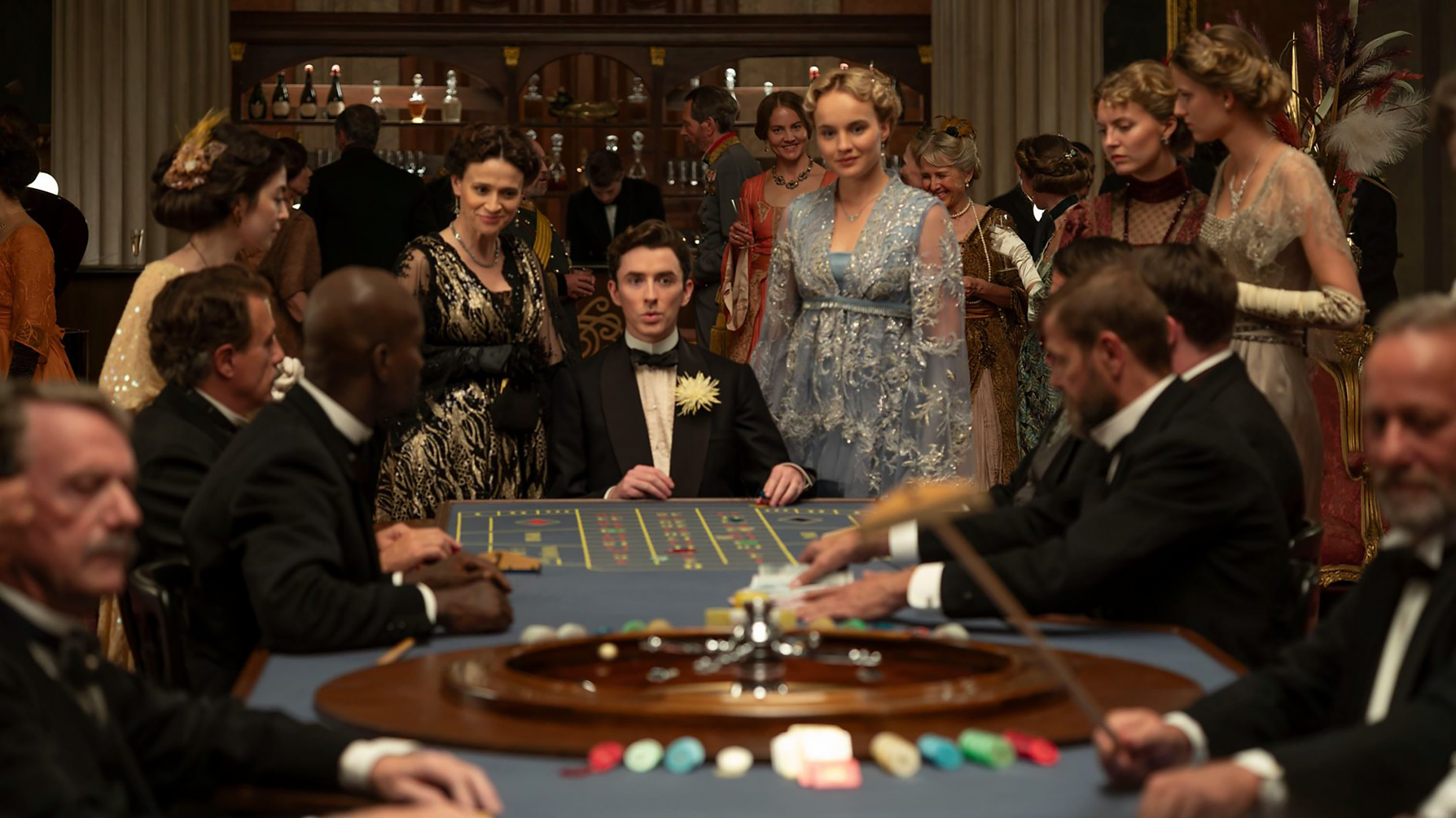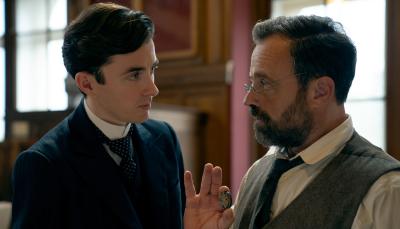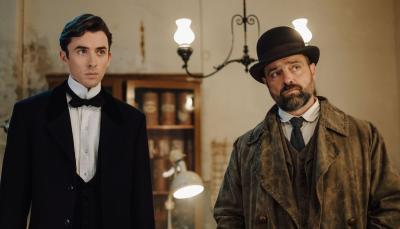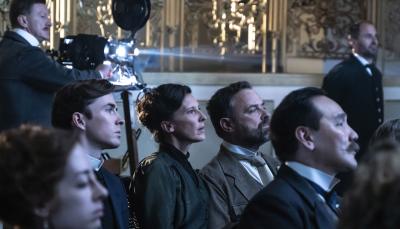'Vienna Blood' Sees Max Lose "A Winning Hand"

Luise von Finckh as Clara Weiss, Matthew Beard as Max and Juergen Maurer as Oskar in 'Vienna Blood' Season 4
Petro Domenigg © 2024 Endor Productions / MR Film
Longtime Vienna Blood viewers will recall that PBS tends to split each season’s feature-length episodes, giving the show a longer run. This time around, those breaks – which have in the past tended strongly towards the clunky – work pretty well. The break between “Mephisto Waltz” and “A Winning Hand” is particularly strong, ending the former on Max and Oscar’s undercover operation planning for their trip to Riegers Palace Casino and opening the latter with an extended scene revisiting Oskar’s digs and his relationship with Therese, who he’d bumped into at the police station a day or so earlier.
I’d hoped that this interaction would lead to more clarity in their relationship (I should know by now that that’s not how a tortured, murder-solving sad man’s potential romantic storyline works). However, it only leaves things murkier than before. Therese wants Oskar to intervene in her current domestic arrangements, and who could blame her? Her husband is often drunk and often violent. She’s confident that he’s planning some caper that the law would frown on, and she and her daughter just aren’t safe with him around, sooooo... could Oskar maybe, y’know, arrest him? Well, no. If no crime has been committed, he must leave it alone. I feel strongly that Oskar’s peak moment of Mr. Billowy Coat King of Pain Guy-ness is yet to come, and we have to be patient as we wait for it to emerge organically.
Thankfully, things are going much better on the undercover operation front. Mendel is in his element, kitting Oskar out in a sharp suit with a colorful brocade waistcoat and luxurious oyster-gray silk ascot. Max looks very sharp in his dinner jacket, Leah is beautiful in her sparkly black frock, and Clara is utterly lovely in shimmery ice blue. This lively scene reminds me of the scene in Little Women where the March sisters vote Laurie into their theatre troupe. It’s much less giddy, but Oskar shares Laurie’s wistful yearning to belong to a more boisterous, warm household like the Liebermanns’.
The team’s arrival at Riegers Palace goes swimmingly until they have to introduce themselves to the casino manager. Max has his identity as Lord Sadler squared away but doesn’t quite stick the landing with the name he and Oskar are making up on the fly for Oskar, Count von Tropmansdorf. If the silly names and Max’s insufficiently haughty attitude with the casino staff (I know — for a man constantly being told his manner is too frosty and arrogant to learn that in this environment, he should be even more severe must be dizzying) weren’t enough, Max casually tossing the special betting chip from Carillo’s personal effects onto the roulette table would draw out the casino’s owner all on its own.
He’s been winning seemingly every round of roulette, but trying to play that chip shows that while luck is on his side, information is not. Proprietress Helena Riegers (Leonie Benesch, who was so good in Babylon Berlin’s first three seasons as the doomed Greta Overbeck) materializes at the table and invites him back to her office for a quiet chat about what exactly he’s doing in her casino. She already knows who Max is but plays along for a bit, trying to get him to admit his true identity. She says she’s pretty like a neurologist in her powers of observation and deduction about people. She grows bolder as she continues, saying Clara’s feelings about Max are at least somewhat hidden; she can see that he’s in love with Clara.
Taking pity on a deeply uncomfortable Max, Helena explains that the chip he tried to play is for a high-stakes game called Chemin de Fer (a French name that translates literally to the road to hell, which sounds great; please sign me up). She’s reluctant to admit Max and Oskar to the players’ table, but since Max has the 1,000 kroner stake necessary to buy into the game and money talks, she agrees to let him play the following night.
Leah explains at home that Chemin de Fer is entirely a game of chance for the idle rich seeking the thrills that only risking obscene sums of money can provide. Max and Oskar, whose attempt to retrieve Carillo’s belongings from the coat room failed when he could not produce the coat check ticket, will return to Riegers Palace to learn more about how Mephisto’s network and the casino are related.
I’m glad Vienna Blood is confronting the long-looming issue of Max and Clara’s relationship in more substance and detail than in the past. I’ve long thought that Max and Clara’s chemistry is at its best when their vibe is between Max’s relationships with Leah and Oskar. They have a genuine rapport, and he enjoys being affectionately needled by her – think of their final scene in Season 3, when they both knew that he owed her several favors, and she was leveraging it for all its worth. That had a vivid spark, but to my eye, their chemistry has never been romantic, and their bond has been most effective when they find the synergy between his cases and her stories.
However, the moment between them as they wait for the fancy car Max hired for the evening to take them home is tailor-made to confound my beliefs. Clara can tell something’s rattled Max, and he confides that Helena made him realize something he hadn’t thought of before. He takes his sweet time trying to articulate it, which is amusing because here’s someone whose professional life revolves around reading other people’s emotions and motivations accurately, who can scarcely access or comprehend his feelings, and just then, the car comes around, blaring its horn. That’s some very broad comedy used to undercut a potentially romantic scene.
Max eventually manages to say he still has feelings for Clara, and good on her for asking if Max wants to get back up on this particular merry-go-round. He promises to remain silent forever if she honestly says she feels nothing. Her response – a plaintive, whispered “Max, please” – isn’t definitive, but her resolute departure suggests to Max (and us), looking forlorn after her, that she’s done. I think this is the most believable moment we’ve seen between them so far. Nobody’s angry, and there’s nothing to fight over, but this is exhausting, and if there ever had been a moment for them to get back together, it’s well and truly passed. This doesn’t prevent her from accompanying Max and Oskar to the casino the following night. She’s a journalist, after all, and isn’t about to miss out on a potentially fascinating story.
Naturally, the Chemin de Fer setup is so exclusive that Max can’t just pop down to a little smoke-filled room down some concealed corridor; Helena must escort him, taking him down a spiral staircase (reminiscent of a descent into hell, and possibly of inducing a hypnotic state) and then accompanying him on a brief, quite Stygian boat ride to the gaming table she’s set up in the disused mines above which her late father built the casino. After a long career as a steel magnate, he bequeathed the casino to her, building railways and bridges throughout Austria.
In repurposing the disused mines, with their echoing pathways and the underground lake, Helena highlights a flair for the dramatic, which she emphasizes further by cloaking the Chemin de Fer game in mystery. Players wear masks and use character names to shield their identities. After introducing Max to The Soldier, The Actress, and The Baron, she tells them their new fellow player is The Englishman (The Doctor was right there, but ok). Max’s lucky streak from the previous evening continues, leading somewhere he feels is too seedy to tolerate. The Baron, who we can see is the same Newspaper Baron who hired Clara to write a weekly column promoting peace with Serbia earlier in the episode, has recognized Clara at the bar and asks if Max would be willing to wager her instead of money.
Max – who, let’s recall, is rarely shocked by even the grimmest manifestations of human behavior – is appalled. His fellow players chuckle at this naivété: of course, they gamble with people! They gamble with anything of value, relishing the thrill of chancing a devastating loss or gaining a stunning win. The Actress describes it as being “all very delicious.” Ew. Max remains horrified and becomes anxious to get Clara out of this situation, so much so that he abruptly departs the game, stalking away from the table as Helena follows along behind, arguing that the morality of what players gamble with is beside the point.
Meanwhile, Oskar has been up in the coat room and has made a very worrying discovery: the late Sr. Carillo’s item is a gun case holding a rifle with a silencer. Unfortunately, an unseen someone snags the case off the shelf and heads down to the caverns. This is going to end in tears. Max, Oskar, and the shadowy gunman all converge eventually in the echo chambers below, with Oskar and the gunman firing at the same time, followed immediately by Max falling to the ground, soaked in blood and barely conscious.
The episode ends on an ambiguous but dreadful note, with Oskar entering a dreamy fugue state, in which Max, still in his evening dress at his own office, tells Oskar he looks terrible. Oskar’s reply that “this is the worst thing he’s ever faced” is interesting because I’d have guessed that his daughter Mitzi dying would have been the worst thing he’d ever faced. I think he means that not only is he convinced that Max will die, but that it will be both his responsibility (for drawing Max into these seedy crime investigations) and his fault (for being the person who inadvertently shot Max).
These Are A Few Of My Favorite Things (From This Episode)
- I’m interpreting Count von Tropmansdorf as a shoutout to Kevin Kline’s delivery of his character Otto’s fake name in this classic scene from A Fish Called Wanda. My Lord, please meet Special Agent Harvey Manfrengensenten of the CIA. Just don’t call him stupid.
- Shoutout to The Baron’s suit during Clara’s interview about her column. It’s a pale wheat color, with slightly darker brown pinstripes and very daring acid-green (almost brat green) piping. This is not a guy from old money; he has a flourishing spirit of sartorial adventure.
- Two items to revisit more substantively next week:
- First, why is Detective Meyer stealing Oskar’s Mephisto-related files right off his desk? That’s not very collegial!
- Second, Oskar eventually visited Therese’s apartment and firmly suggested to her garbage husband that he should consider a permanent relocation to another city. Will this fellow take Oskar’s advice? Will he come after Therese and Hannah? Oskar needs further complications, like he needs a hole in the head!
Vienna Blood Season 4 continues on most PBS stations, the PBS app, and the PBS Masterpiece Prime Video Channel at 10 p.m. ET on Sundays through the end of January. All four episodes are available for members to watch as a binge (or as initially intended, i.e., two two-hour-long episodes) on PBS Passport. As always, check your local listings and streamers.

